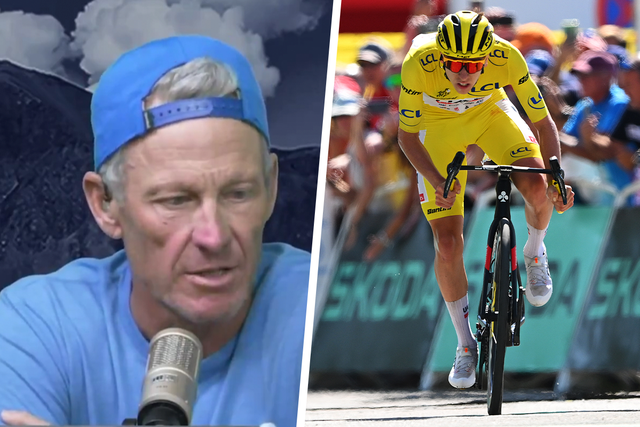
In a striking commentary that has stirred the cycling community, Lance Armstrong, the seven-time Tour de France champion whose legacy is marred by doping scandals, has aimed Tadej Pogacar and the UAE Team Emirates following a controversial stage at the 2024 Tour de France. Armstrong’s remarks came during a discussion on his podcast, where he expressed his confusion over the team’s tactics and decision-making process during a critical race. “I don’t understand what they do in their meetings; it doesn’t make sense what they did,” he stated, drawing attention to the strategic missteps that led to Pogacar losing his overall lead to Poland’s Katarzyna Niewiadoma.
The Context: A Pivotal Stage at the Tour de France
The 2024 Tour de France has been filled with excitement and drama, with Pogacar initially dominating the competition. However, during the eleventh stage, everything changed. Pogacar, riding strong throughout the race, suffered a setback that would alter his trajectory in the competition. The stage was expected to be a turning point for Pogacar and his team, as they aimed to extend their lead over rivals like Jonas Vingegaard.
During this crucial stage, Pogacar attacked 31 kilometres from the finish line but found himself isolated after burning through his teammates too quickly. As he created an initial gap, it appeared he was on track to regain control of the race. However, Vingegaard managed to claw back the distance on subsequent climbs, ultimately leaving Pogacar vulnerable.
Armstrong’s critique focuses on the apparent lack of strategy employed by UAE Team Emirates during this pivotal moment. “They had four riders in the top 10,” he noted. “It was a hard stage, but it was a stage to make a difference.” His comments reflect a broader frustration within cycling circles regarding team dynamics and decision-making in high-pressure situations.
The Fallout: Reactions from Cycling Experts
Armstrong’s comments have sparked intense discussions among cycling analysts and fans alike. Many have echoed his sentiments regarding UAE Team Emirates’ tactics during the race. George Hincapie, a former professional cyclist and Armstrong’s co-host on The Move podcast expressed disbelief at how Pogacar’s team managed their resources. “It was a strange stage,” Hincapie remarked. “Pogacar had two teammates next to him and there were 30 kilometres left in the stage; he should have been able to maintain his lead.”
Bradley Wiggins also weighed in on the discussion, emphasizing that Pogacar’s aggressive attack may have been ill-timed given the circumstances. “He showed weakness in his confidence,” Wiggins noted, suggesting that Pogacar’s decision-making could have been influenced by pressure rather than strategic foresight.
The Implications for Pogacar and UAE Team Emirates
Pogacar’s fall from grace during this stage raises important questions about his future in the competition and how UAE Team Emirates will respond moving forward. As one of cycling’s brightest stars, Pogacar has consistently demonstrated remarkable talent and resilience; however, this recent setback could impact his mental state as he navigates subsequent stages.
The pressure on Pogacar is immense—not only is he defending his title as champion, but he is also under scrutiny from fans and analysts who expect him to perform at an elite level consistently. Armstrong’s comments serve as a reminder of how quickly fortunes can change in professional cycling and how critical it is for teams to adapt their strategies effectively.
Armstrong’s Legacy: A Controversial Figure
Lance Armstrong’s insights into Pogacar’s situation come with their own set of complexities. While he remains an influential voice in cycling discussions due to his extensive experience and knowledge of the sport, Armstrong’s past doping scandals cast a long shadow over his credibility. Many within the cycling community are wary of taking advice from someone whose career was built on deception.
Despite this scepticism, Armstrong’s analysis often resonates with fans who appreciate candid discussions about racing tactics and strategies. His perspective as both a competitor and commentator offers valuable insights into what it takes to succeed at the highest levels of professional cycling.
The Future of Cycling Strategy
As discussions about team dynamics continue within the cycling community following this incident, both riders and teams need to learn from these experiences. Building strong bonds among teammates can lead to greater success on race day while fostering a sense of unity within cycling organizations.
Moreover, this situation highlights the need for teams to prioritize communication and strategy development as they prepare for future races. Understanding how best to leverage each rider’s strengths while managing pressures will be key for teams like UAE Team Emirates if they hope to reclaim their competitive edge.
Looking Ahead: What Lies Ahead for Pogacar
As Tadej Pogacar prepares for the upcoming stages in this year’s Tour de France, he must focus on regaining momentum while navigating through challenges posed by rival teams. With several stages remaining—each carrying significant weight in determining overall standings—Pogacar has ample opportunities for redemption.
“I’m excited about what’s next,” said Pogacar after reflecting on his performance during the eleventh stage. “I know I have what it takes to bounce back.” His determination reflects an unwavering spirit that resonates with fans who appreciate resilience in athletes.
The upcoming stages will test not only Pogacar’s physical abilities but also his mental fortitude as he seeks to overcome recent setbacks while maintaining focus amidst external pressures.
A Lesson in Strategy and Resilience
Lance Armstrong’s critique of Tadej Pogacar and UAE Team Emirates following their missteps during the eleventh stage of the Tour de France serves as both an eye-opener and a reminder of how critical teamwork is in professional sports. While emotions ran high during this incident—both riders have expressed intentions to move forward without lingering animosity.
As we celebrate both Pogacar’s talent and the growing visibility of athletes in cycling—one thing remains clear: teamwork is essential not only for winning races but also for fostering an environment where all athletes can thrive together! With each new race comes fresh growth opportunities—and perhaps even new rivalries waiting to unfold!
Leave a Reply